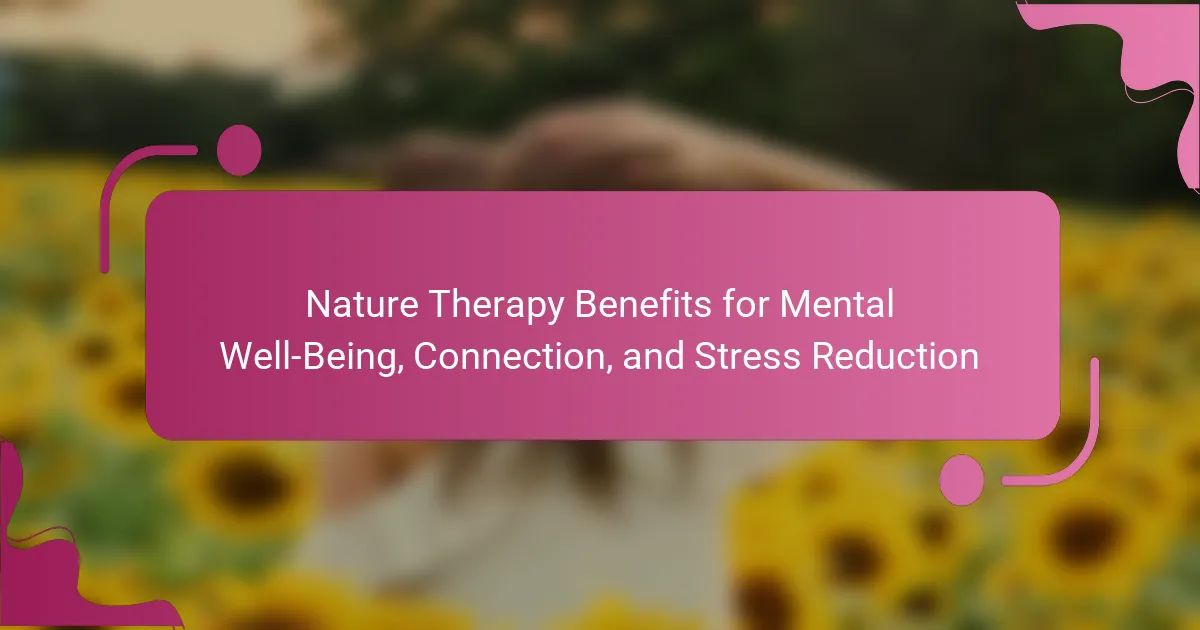Nature therapy offers significant benefits for mental well-being by reducing stress and fostering emotional connection. Engaging with natural environments lowers cortisol levels and enhances mood. This article explores how nature therapy promotes mindfulness, emotional resilience, and unique sensory experiences. Additionally, it provides practical tips for integrating nature into daily life to improve overall mental health.

How does nature therapy enhance mental well-being?
Nature therapy significantly enhances mental well-being by fostering a connection with nature, reducing stress, and promoting emotional healing. Engaging with natural environments lowers cortisol levels, which are linked to stress. Studies show that spending time outdoors can improve mood, increase feelings of tranquility, and enhance overall mental health. Nature therapy often incorporates unique attributes like mindfulness practices and sensory experiences, which deepen the therapeutic effects. As a result, individuals report heightened feelings of belonging and reduced anxiety, making nature therapy a valuable tool for mental well-being.
What are the psychological benefits of spending time in nature?
Spending time in nature offers significant psychological benefits, including improved mental well-being and reduced stress. Nature therapy enhances mood, decreases anxiety, and fosters a sense of connection to the environment. Studies show that exposure to natural settings can lead to lower levels of cortisol, the stress hormone. Engaging with nature promotes mindfulness, encouraging individuals to focus on the present moment and alleviate negative thoughts. As a result, regular interaction with nature can enhance overall mental health and resilience.
How does exposure to green spaces impact stress levels?
Exposure to green spaces significantly reduces stress levels. Nature therapy enhances mental well-being by promoting relaxation and reducing anxiety. Studies show that spending time in natural environments lowers cortisol, a key stress hormone. For example, individuals who engage in regular nature walks report improved mood and lower stress levels. The unique attribute of nature therapy is its ability to foster a deep connection with the environment, which further aids in stress reduction.
Which mental health conditions can nature therapy help alleviate?
Nature therapy can help alleviate anxiety, depression, PTSD, and stress-related disorders. Engaging with nature promotes emotional well-being and reduces negative thoughts. Research indicates that spending time outdoors can lower cortisol levels, enhancing mood and relaxation. For instance, studies show that nature exposure can significantly decrease symptoms of anxiety and improve overall mental health.

What role does connection to nature play in emotional health?
Connection to nature significantly enhances emotional health by reducing stress and promoting mental well-being. Nature therapy offers various benefits that foster emotional resilience and connection.
Research shows that spending time in natural environments lowers cortisol levels, which alleviates stress. Engaging with nature can improve mood and increase feelings of happiness. Additionally, nature therapy encourages mindfulness, allowing individuals to focus on the present moment, which contributes to overall mental clarity.
Nature therapy can take many forms, including forest bathing, gardening, and nature walks. Each of these activities provides unique experiences that can improve emotional health. For instance, forest bathing has been linked to lower anxiety levels and improved emotional stability.
In summary, a strong connection to nature serves as a powerful tool for enhancing emotional health, reducing stress, and fostering a sense of connection to oneself and the environment.
How does nature foster a sense of belonging and community?
Nature fosters a sense of belonging and community through shared experiences and connections among individuals. Engaging in outdoor activities promotes social interaction, enhancing mental well-being and reducing stress. Studies show that group nature therapy sessions can deepen relationships and create supportive networks. This collective experience in natural settings helps individuals feel connected to something larger than themselves, reinforcing their sense of community.
What are the social benefits of group nature therapy sessions?
Group nature therapy sessions offer significant social benefits, enhancing connections and reducing stress. Participants often experience improved communication skills and a sense of belonging. Shared activities in nature foster teamwork and empathy, creating lasting friendships. Research shows that social support from group interactions can lead to lower anxiety levels and increased resilience. Nature’s calming effects further amplify these benefits, promoting a collective sense of well-being.

How can nature therapy be integrated into daily life?
Integrating nature therapy into daily life enhances mental well-being and reduces stress. Start by incorporating outdoor activities, such as walking in parks or gardening. Schedule regular time in natural settings to foster connection with the environment. Mindfulness practices, like meditation in nature, can deepen the experience. Engaging in nature-based hobbies, such as birdwatching or nature photography, also promotes mental health. Consider using nature sounds or visuals in your home to create a calming atmosphere.
What are practical ways to incorporate nature into a busy schedule?
Incorporating nature into a busy schedule can enhance mental well-being and reduce stress. Simple practices include taking short walks in green spaces, using plants in your workspace, and scheduling outdoor breaks.
1. Take a 10-minute walk in a nearby park during lunch.
2. Keep indoor plants to improve air quality and mood.
3. Spend time in natural light, even if it’s just sitting by a window.
4. Plan weekend hikes or nature outings to recharge.
5. Use nature sounds or visuals during work for relaxation.
These activities can foster a connection to nature, promoting overall mental health.
Which activities in nature are most beneficial for mental health?
Nature therapy activities significantly enhance mental health by promoting well-being, connection, and stress reduction. Engaging in outdoor activities like hiking, gardening, and mindfulness walks fosters a sense of calm and connection to the environment.
Research indicates that spending time in nature reduces anxiety and depression levels. A study found that individuals who participated in nature walks experienced a 20% decrease in stress levels. Additionally, nature therapy encourages social interactions, enhancing feelings of belonging and support.
Unique attributes of nature therapy include its accessibility; individuals can engage in these activities regardless of their fitness level. Rarely, specific environments, such as forests or coastal areas, can amplify these benefits, providing unique sensory experiences that further enhance mental health.

What unique attributes differentiate nature therapy practices?
Unique attributes of nature therapy include its adaptability to various environments, the incorporation of sensory experiences, and its emphasis on mindfulness. These aspects foster deeper emotional connections and enhance stress reduction. Nature therapy practices often utilize unique settings, such as forests or beaches, which differentiate them from traditional therapeutic methods. Additionally, the integration of physical activity, like hiking or gardening, further distinguishes nature therapy by promoting both mental and physical well-being.
How do different cultures approach nature therapy?
Different cultures approach nature therapy through unique practices that enhance mental well-being and reduce stress. For instance, Japanese Shinrin-yoku, or forest bathing, emphasizes immersion in nature to promote relaxation and connection. In contrast, Scandinavian cultures often incorporate outdoor activities, like hiking and skiing, to foster community and mental health. Indigenous practices worldwide may involve rituals that honor nature, creating a profound sense of belonging and peace. These diverse approaches highlight the universal value of nature therapy in enhancing mental health across cultures.
What innovative nature therapy programs are emerging in urban areas?
Innovative nature therapy programs are increasingly emerging in urban areas, focusing on mental well-being and stress reduction. These programs often integrate green spaces, community gardens, and outdoor mindfulness activities. Urban nature therapy fosters a connection to nature, enhancing emotional resilience and reducing anxiety. For instance, programs that incorporate forest bathing or guided nature walks have shown significant improvements in participants’ mental health. These initiatives highlight the unique attribute of urban nature therapy by transforming city environments into therapeutic landscapes.

Which rare aspects of nature therapy contribute to its effectiveness?
Rare aspects of nature therapy include unique sensory experiences, biophilia effects, and specific environmental factors that enhance mental well-being. These elements foster deep emotional connections and promote stress reduction. Sensory experiences, such as the sound of water or rustling leaves, can trigger calming responses. Biophilia, the innate affinity for nature, can improve mood and cognitive function. Additionally, specific environments, like forests or beaches, provide restorative benefits that are not easily replicated indoors. These rare attributes contribute significantly to the overall effectiveness of nature therapy.
How can specific natural environments enhance therapeutic outcomes?
Natural environments significantly enhance therapeutic outcomes by promoting mental well-being, fostering connection, and reducing stress. Exposure to nature lowers cortisol levels, which directly impacts stress reduction. Studies show that individuals engaged in nature therapy report improved mood and decreased anxiety.
Natural settings encourage social interactions, enhancing feelings of connection and community. Research indicates that group activities in nature lead to stronger interpersonal bonds and increased support networks.
Unique attributes of specific environments, such as forests or coastal areas, offer distinct benefits. For example, forest therapy, or shinrin-yoku, has been shown to improve immune function and lower blood pressure.
Incorporating nature into therapeutic practices can vary in form, such as guided walks or mindfulness sessions outdoors. These approaches capitalize on the restorative effects of nature, leading to more effective mental health interventions.
What are the long-term benefits of nature therapy on mental health?
Nature therapy offers significant long-term benefits for mental health, including improved emotional resilience and reduced anxiety. Engaging with nature fosters a sense of connection, enhancing overall well-being. Studies show that exposure to natural environments can lead to a 20% reduction in stress levels over time. Nature therapy promotes mindfulness, which is linked to better coping strategies and emotional regulation. Regular participation in nature-based activities can also improve mood and decrease symptoms of depression, contributing to a more balanced mental state.

What expert tips can enhance the effectiveness of nature therapy?
Engaging in nature therapy can significantly enhance mental well-being and reduce stress. Here are expert tips to maximize its effectiveness:
1. Choose diverse environments: Explore forests, beaches, or mountains to experience varied benefits.
2. Practice mindfulness: Focus on your surroundings to deepen your connection with nature.
3. Incorporate physical activity: Engage in walking, hiking, or yoga outdoors to boost mood.
4. Limit distractions: Leave devices behind to fully immerse in the natural experience.
5. Create a routine: Regular visits to nature can strengthen mental resilience and reduce anxiety.
How to choose the right natural setting for therapy sessions?
To choose the right natural setting for therapy sessions, consider factors like tranquility, accessibility, and sensory stimulation. A peaceful environment enhances relaxation and focus. Settings like parks or forests provide natural beauty and fresh air, promoting mental well-being. Accessibility ensures clients can reach the location comfortably. Sensory stimulation from nature can reduce stress and improve mood, making it an ideal backdrop for therapy.
What common mistakes should be avoided when practicing nature therapy?
Common mistakes to avoid in nature therapy include neglecting preparation, ignoring personal limits, and failing to engage with the environment. Proper planning enhances the experience, while respecting physical boundaries prevents discomfort. Engaging with nature mindfully fosters deeper connections and amplifies mental well-being benefits.
